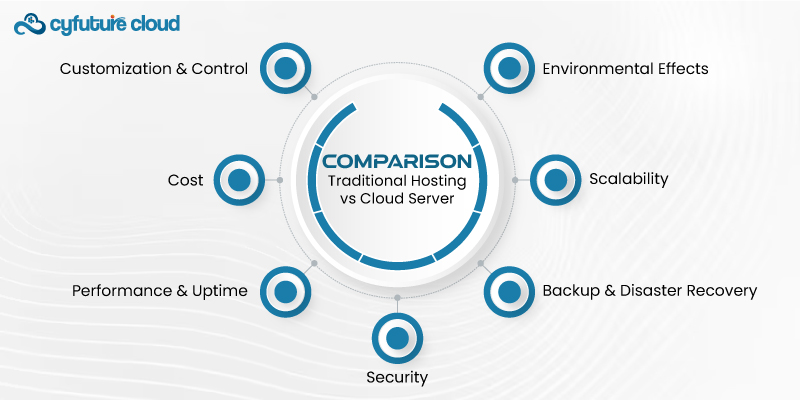Get 69% Off on Cloud Hosting : Claim Your Offer Now!
- Products
-
Compute
Compute
- Predefined TemplatesChoose from a library of predefined templates to deploy virtual machines!
- Custom TemplatesUse Cyfuture Cloud custom templates to create new VMs in a cloud computing environment
- Spot Machines/ Machines on Flex ModelAffordable compute instances suitable for batch jobs and fault-tolerant workloads.
- Shielded ComputingProtect enterprise workloads from threats like remote attacks, privilege escalation, and malicious insiders with Shielded Computing
- GPU CloudGet access to graphics processing units (GPUs) through a Cyfuture cloud infrastructure
- vAppsHost applications and services, or create a test or development environment with Cyfuture Cloud vApps, powered by VMware
- Serverless ComputingNo need to worry about provisioning or managing servers, switch to Serverless Computing with Cyfuture Cloud
- HPCHigh-Performance Computing
- BaremetalBare metal refers to a type of cloud computing service that provides access to dedicated physical servers, rather than virtualized servers.
-
Storage
Storage
- Standard StorageGet access to low-latency access to data and a high level of reliability with Cyfuture Cloud standard storage service
- Nearline StorageStore data at a lower cost without compromising on the level of availability with Nearline
- Coldline StorageStore infrequently used data at low cost with Cyfuture Cloud coldline storage
- Archival StorageStore data in a long-term, durable manner with Cyfuture Cloud archival storage service
-
Database
Database
- MS SQLStore and manage a wide range of applications with Cyfuture Cloud MS SQL
- MariaDBStore and manage data with the cloud with enhanced speed and reliability
- MongoDBNow, store and manage large amounts of data in the cloud with Cyfuture Cloud MongoDB
- Redis CacheStore and retrieve large amounts of data quickly with Cyfuture Cloud Redis Cache
-
Automation
Automation
-
Containers
Containers
- KubernetesNow deploy and manage your applications more efficiently and effectively with the Cyfuture Cloud Kubernetes service
- MicroservicesDesign a cloud application that is multilingual, easily scalable, easy to maintain and deploy, highly available, and minimizes failures using Cyfuture Cloud microservices
-
Operations
Operations
- Real-time Monitoring & Logging ServicesMonitor & track the performance of your applications with real-time monitoring & logging services offered by Cyfuture Cloud
- Infra-maintenance & OptimizationEnsure that your organization is functioning properly with Cyfuture Cloud
- Application Performance ServiceOptimize the performance of your applications over cloud with us
- Database Performance ServiceOptimize the performance of databases over the cloud with us
- Security Managed ServiceProtect your systems and data from security threats with us!
- Back-up As a ServiceStore and manage backups of data in the cloud with Cyfuture Cloud Backup as a Service
- Data Back-up & RestoreStore and manage backups of your data in the cloud with us
- Remote Back-upStore and manage backups in the cloud with remote backup service with Cyfuture Cloud
- Disaster RecoveryStore copies of your data and applications in the cloud and use them to recover in the event of a disaster with the disaster recovery service offered by us
-
Networking
Networking
- Load BalancerEnsure that applications deployed across cloud environments are available, secure, and responsive with an easy, modern approach to load balancing
- Virtual Data CenterNo need to build and maintain a physical data center. It’s time for the virtual data center
- Private LinkPrivate Link is a service offered by Cyfuture Cloud that enables businesses to securely connect their on-premises network to Cyfuture Cloud's network over a private network connection
- Private CircuitGain a high level of security and privacy with private circuits
- VPN GatewaySecurely connect your on-premises network to our network over the internet with VPN Gateway
- CDNGet high availability and performance by distributing the service spatially relative to end users with CDN
-
Media
-
Analytics
Analytics
-
Security
Security
-
Network Firewall
- DNATTranslate destination IP address when connecting from public IP address to a private IP address with DNAT
- SNATWith SNAT, allow traffic from a private network to go to the internet
- WAFProtect your applications from any malicious activity with Cyfuture Cloud WAF service
- DDoSSave your organization from DoSS attacks with Cyfuture Cloud
- IPS/ IDSMonitor and prevent your cloud-based network & infrastructure with IPS/ IDS service by Cyfuture Cloud
- Anti-Virus & Anti-MalwareProtect your cloud-based network & infrastructure with antivirus and antimalware services by Cyfuture Cloud
- Threat EmulationTest the effectiveness of cloud security system with Cyfuture Cloud threat emulation service
- SIEM & SOARMonitor and respond to security threats with SIEM & SOAR services offered by Cyfuture Cloud
- Multi-Factor AuthenticationNow provide an additional layer of security to prevent unauthorized users from accessing your cloud account, even when the password has been stolen!
- SSLSecure data transmission over web browsers with SSL service offered by Cyfuture Cloud
- Threat Detection/ Zero DayThreat detection and zero-day protection are security features that are offered by Cyfuture Cloud as a part of its security offerings
- Vulnerability AssesmentIdentify and analyze vulnerabilities and weaknesses with the Vulnerability Assessment service offered by Cyfuture Cloud
- Penetration TestingIdentify and analyze vulnerabilities and weaknesses with the Penetration Testing service offered by Cyfuture Cloud
- Cloud Key ManagementSecure storage, management, and use of cryptographic keys within a cloud environment with Cloud Key Management
- Cloud Security Posture Management serviceWith Cyfuture Cloud, you get continuous cloud security improvements and adaptations to reduce the chances of successful attacks
- Managed HSMProtect sensitive data and meet regulatory requirements for secure data storage and processing.
- Zero TrustEnsure complete security of network connections and devices over the cloud with Zero Trust Service
- IdentityManage and control access to their network resources and applications for your business with Identity service by Cyfuture Cloud
-
-
Compute
- Solutions
-
Solutions
Solutions
-
 Cloud
Hosting
Cloud
Hosting
-
 VPS
Hosting
VPS
Hosting
-
GPU Cloud
-
 Dedicated
Server
Dedicated
Server
-
 Server
Colocation
Server
Colocation
-
 Backup as a Service
Backup as a Service
-
 CDN
Network
CDN
Network
-
 Window
Cloud Hosting
Window
Cloud Hosting
-
 Linux
Cloud Hosting
Linux
Cloud Hosting
-
Managed Cloud Service
-
Storage as a Service
-
 VMware
Public Cloud
VMware
Public Cloud
-
 Multi-Cloud
Hosting
Multi-Cloud
Hosting
-
 Cloud
Server Hosting
Cloud
Server Hosting
-
 Bare
Metal Server
Bare
Metal Server
-
 Virtual
Machine
Virtual
Machine
-
 Magento
Hosting
Magento
Hosting
-
Remote Backup
-
 DevOps
DevOps
-
 Kubernetes
Kubernetes
-
 Cloud
Storage
Cloud
Storage
-
NVMe Hosting
-
 DR
as s Service
DR
as s Service
-
-
Solutions
- Marketplace
- Pricing
- Resources
- Resources
-
By Product
Use Cases
-
By Industry
- Company
-
Company
Company
-
Company
Which Is Better for Your Company: Traditional Hosting or Cloud Server?
Table of Contents
- Traditional Hosting: What Is It?
- A Cloud Server: What Is It?
- Let’s begin the comparison now.
- Scalability: The Leading Role of Cloud Server
- Cost: Only Pay for the Cloud Use You Make
- Performance and Uptime
- Security: Both Have Strong Points, But Cloud Excels in Flexibility
- Customization and Control: Complete Control Is Available with Dedicated Hosting
- Cloud Is the Undisputed Winner in Backup and Disaster Recovery
- Environmental Effects: Cloud Computing Is More Eco-Friendly
- In conclusion, which is best for your company?
Businesses must make decisions all the time in the rapidly changing world of technology, especially when it comes to their IT infrastructure. One such important choice is whether to use traditional hosting or cloud servers for your hosting needs. Although each has advantages of its own, choose the best one may have a big influence on the expenses, scalability, and efficiency of your company. To assist you in choosing the best option for your company, we will compare cloud servers with traditional hosting in this article.
Traditional Hosting: What Is It?
Let’s first define traditional hosting before getting into the comparison. Shared hosting and dedicated hosting are the two main types into which traditional hosting can be separated.
Several websites share a single server and its resources (RAM, CPU, storage, etc.) while using shared hosting. Although this kind of hosting is less expensive, if one of the websites on the server consumes too much bandwidth, performance problems may arise.
Dedicated Hosting: In contrast, dedicated hosting offers a single server that is used only by one company. Better performance results from having complete control over the server and its resources. It is more expensive, though.
Both forms of conventional hosting have been in use for many years and are the foundation of several apps and websites. However, many firms are searching for a more scalable and agile solution as their operations expand and client expectations rise. This is the part where we seek Cloud Servers for help.
A Cloud Server: What Is It?
Instead of being housed on a physical server, a cloud server is a virtual server that operates in a cloud computing environment. Cloud hosting disperses your data around several linked computers, forming a virtual environment, as opposed to keeping it on a single computer.
The features of cloud servers include resilience, scalability, and flexibility. Businesses only pay for the resources they use using these servers’ “pay-as-you-go” concept, which makes them a desirable choice for both startups and large corporations.
Let’s begin the comparison now.

Scalability: The Leading Role of Cloud Server
Scalability is one of the main benefits of cloud servers. Depending on your demands, scaling up or down is simple, regardless of the size of your application or eCommerce website. With only a few clicks, you may increase resources like CPU, RAM, and storage in the cloud environment—something that traditional hosting providers find difficult to do.
Traditional hosting, especially dedicated servers, on the other hand, are not very scalable. You may need to spend more money and time on new hardware if your website’s traffic increases. Because resources are shared with other websites, scalability is further limited with shared hosting.
Cyfuture Cloud offers flexible cloud hosting solutions that can scale effortlessly with your business. Whether you need more storage or computing power, we’ve got you covered, so your business is always ready for growth.
Cost: Only Pay for the Cloud Use You Make
Cost may be a deciding issue for startups or small enterprises. Because cloud servers employ a pay-as-you-go paradigm, you are only charged for the resources that you really use. This reduces needless expenses and does away with the necessity for over-provisioning. Businesses may avoid high upfront costs by spreading out their IT expenditures over time using cloud hosting.
On the other hand, traditional hosting frequently entails long-term commitments and set arrangements. Regardless of whether you’re using the server’s full capacity or not, dedicated hosting requires payment. Despite being less expensive, shared hosting does not offer you the freedom to control and optimize expenses according to actual resource utilization.
Cloud Hosting lets businesses have full control over the cloud resources as they can opt for pay-per-use model, therefore, they can manage the resources even in the cases of fluctuating traffic or seasonal demand spikes.
Performance and Uptime
Cloud Ensures Stability Cloud servers generally outperform traditional hosting in terms of performance and uptime because your data is spread across multiple servers in a cloud environment, reducing the risk of hardware failure-related downtime. If one server fails, another takes over seamlessly, ensuring high availability and business continuity.
Although dedicated servers provide good performance, they lack the redundancy and failover mechanisms that cloud infrastructure offers. Shared hosting, being resource-constrained, frequently experiences performance dips, particularly during traffic surges.
Security: Both Have Strong Points, But Cloud Excels in Flexibility
Both cloud servers and traditional hosting offer strong security features. While dedicated servers provide physical security because you have complete control over your own hardware, cloud servers are becoming a stronghold for security with advanced encryption, firewalls, and AI-based monitoring systems.
One of the main advantages of cloud servers is that they offer multi-layered security through shared resources and virtual environments. Additionally, many cloud providers, such as Cyfuture Cloud, offer Data Localization options, which guarantee that your data is stored securely within designated regions.
Regular security updates and patches are also provided by cloud hosting environments, whereas traditional hosting may require you to handle security updates and monitoring yourself, which calls for technical know-how.
Customization and Control: Complete Control Is Available with Dedicated Hosting
Dedicated hosting is an excellent choice for businesses that require complete control, security, and customization over their environment. With Windows Dedicated Servers or a Linux Dedicated Server, you gain full administrative or root access, allowing you to tailor the hardware and software stack to your exact needs. This means you can configure applications, manage updates, optimize performance, and maintain the entire server according to your operational requirements.
While cloud servers offer greater flexibility and scalability, they may not provide the same level of control and dedicated resource availability as a physical server. Still, many organizations find that the cloud’s elasticity suits their evolving workloads without the burden of managing physical infrastructure. For projects demanding high performance, deep customization, or specific OS-level control, dedicated hosting remains a powerful and reliable solution.
Cloud Is the Undisputed Winner in Backup and Disaster Recovery
Backup and disaster recovery are two areas where cloud servers obviously outperform conventional hosting. The majority of cloud hosting companies feature automated backups, which facilitates enterprises’ ability to promptly restore data in the event of an emergency. You may set up cloud-based backup programs to run on a regular basis, guaranteeing that your data is always current and secure.
In conventional hosting, the business is usually responsible for data backup, particularly in dedicated and shared hosting setups. Recovery in the event of a failure may take longer, and this can be a laborious and time-consuming procedure.
Environmental Effects: Cloud Computing Is More Eco-Friendly
Businesses must manage their own servers while using traditional hosting, especially dedicated servers, which results in increased energy use. Despite being more effective, shared hosting does not yet have the energy optimizations that cloud systems provide.
Businesses may reduce their carbon footprint and help create a more sustainable future by moving to cloud hosting.
In conclusion, which is best for your company?
In the end, your budget, growth goals, and company requirements will determine whether you choose a cloud server or traditional hosting.
If you want cost-effectiveness, scalability, and flexibility, cloud servers are perfect. They are appropriate for contemporary, expanding enterprises since they provide improved uptime, security, and disaster recovery alternatives.
If your company needs complete control over the server and doesn’t require the scalability that the cloud offers, traditional hosting—especially dedicated servers—might still be a suitable choice.
If you’re still unsure about the right choice, Cyfuture Cloud is here to help. We offer cloud hosting solutions tailored to meet the unique needs of your business. Whether you’re a startup or an enterprise, we provide a reliable, scalable, and secure environment to ensure your business thrives.
Choose the future of hosting — choose Cyfuture Cloud!
Recent Post

Stay Ahead of the Curve.
Join the Cloud Movement, today!
© Cyfuture, All rights reserved.
Send this to a friend

 Pricing
Calculator
Pricing
Calculator
 Power
Power
 Utilities
Utilities VMware
Private Cloud
VMware
Private Cloud VMware
on AWS
VMware
on AWS VMware
on Azure
VMware
on Azure Service
Level Agreement
Service
Level Agreement 



















